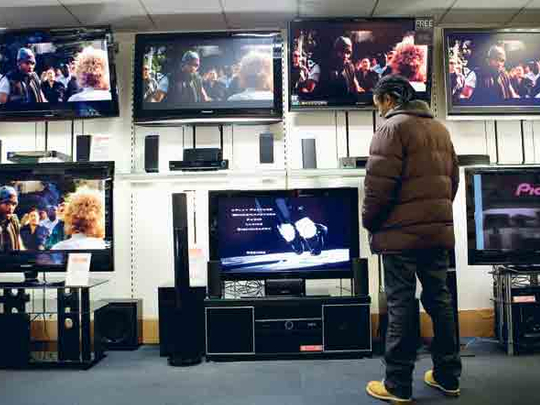
London: The UK's retail sales rose more than economists forecast in June as the World Cup tournament stoked purchases at electrical goods shops and department stores.
Consumer spending may be strengthening after unemployment fell in the three months through May as the recovery gained momentum. While economists forecast the economy doubled its pace of growth in the second quarter, shoppers may limit purchases as the government implements the biggest budget squeeze since the Second World War to reduce the record deficit.
Sales climbed 0.7 per cent on the month, the Office for National Statistics has said. Economists forecast a 0.5 per cent gain, according to the median of 24 estimates in a Bloomberg News survey. From a year earlier, sales rose 1.3 per cent.
‘Steady increase'
"We see a slow and steady increase in consumer spending as the recovery gains traction," Philip Shaw, an economist at Investec Securities in London, said in a telephone interview. "Fears about government spending cuts will probably have some effects on consumer psychology."
Sales at non-specialised stores, which includes department outlets, rose 1.5 per cent in June from May, while sales at household goods shops jumped 1.6 per cent. Statistics office officials said electrical goods stores benefited in the run-up to the World Cup soccer tournament and from promotions to lure shoppers.
John Lewis Partnership plc, owner of the namesake department stores and Waitrose supermarkets, said that sales at its department shops rose 9.1 per cent in the week ending July 10 from a year earlier.
Food sales rose 0.6 per cent on the month and were down 0.2 per cent from a year earlier, the statistics office said. In the quarter through June, food sales were up 0.9 per cent from the previous three months. Non-food sales gained 1.2 per cent on the month and climbed 1.5 per cent on a three-month basis.
Excluding fuel, retail sales increased 1 per cent in June from May and were up 3.1 per cent on the year.
The UK inflation rate rose to a 17-month high in April and was at 3.2 per cent in June, above the government's 3 per cent upper limit. Consumers' expectations for price increases for the coming year eased to 2.7 per cent this month from 3 per cent in June, which was the highest in 21 months, Citigroup Inc. said citing a YouGov plc poll.
Budget impact
Bank of England officials said in the minutes of their July 8 meeting that while the impact of the budget measures on the economy were "hard to gauge," it was "likely that they had pushed down a little on the most likely path for output."
Marks & Spencer Group, the UK's largest clothing retailer, said July 7 it's "cautious" about the outlook for consumer spending after reporting slowing first-quarter sales growth.
The economy probably expanded 0.6 per cent in the second quarter, twice the pace in the previous three months, according to the median of 32 economists in a Bloomberg News survey.
Protecting shoppers
Britain's anti-trust regulator consulted with EBay Inc., Google Inc. and other companies on a national strategy to increase protection for UK shoppers who spent £38 billion (Dh139.5) on-line last year.
The proposed plan calls for the Office of Fair Trading to investigate, issue fines and file lawsuits when industry-led efforts to increase competition and guard consumers from fraud fail or aren't in place, the London-based watchdog said in a statement.
"This strategy will help drive competition and growth by using more focused methods to protect consumers," Noah Curthoys, an OFT director, said in the statement. "This will ensure the UK is one of the global leaders in on-line enforcement."
Internet transactions last year comprised 9.5 per cent of the UK's retail sales, more than in any other European country, the OFT said. Seventy-one per cent of the country's retailers use Internet sales channels compared with an average of 51 per cent in the 27-nation EU.
The government asked for the plan as 6 per cent of Internet users have lost money online due to Internet fraud, the OFT said. The OFT said it needs feedback from more businesses, consumers and trade groups before publishing the proposal in December. The regulator said it also consulted with Microsoft Corp., Cisco Systems Inc. and Amazon.com Inc.












